
Find Help
More Items From Ergsy search
-

Can my landlord evict me without providing a reason?
Relevance: 100%
-
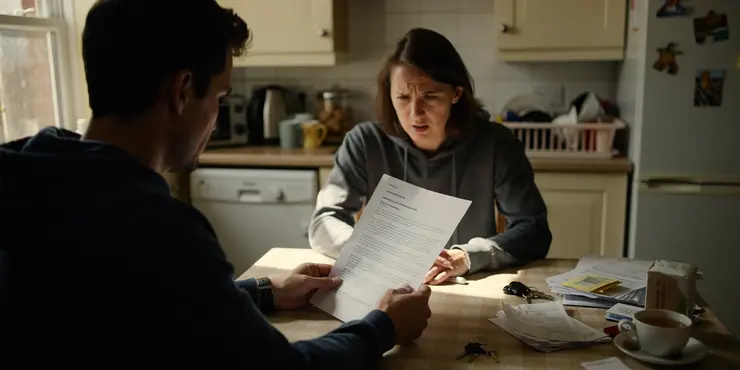
What can I do if my landlord wants to evict me?
Relevance: 84%
-

Can I negotiate with my landlord to avoid eviction?
Relevance: 78%
-

Can a landlord evict me for complaining about property conditions?
Relevance: 74%
-

What should I do if I receive an eviction notice from my landlord?
Relevance: 73%
-

Can a landlord lock me out or remove my belongings to evict me?
Relevance: 72%
-

Are there changes to the eviction process?
Relevance: 63%
-
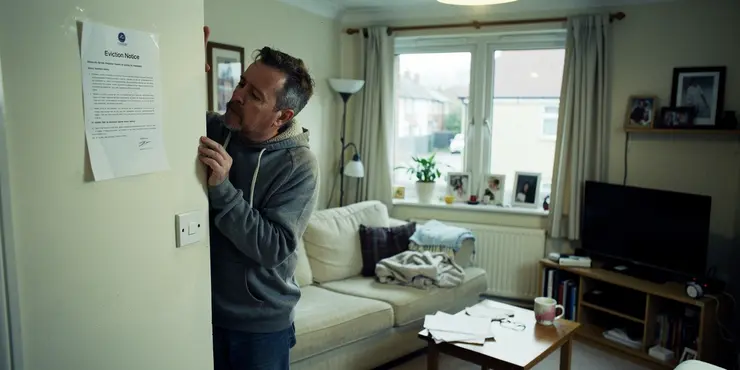
What are my rights during the eviction process?
Relevance: 61%
-

What can I do if I believe my eviction is retaliatory?
Relevance: 59%
-

Can I stop an eviction if I catch up on rent payments?
Relevance: 58%
-

How can I prepare for an eviction court hearing?
Relevance: 57%
-

Does filing for bankruptcy stop an eviction?
Relevance: 57%
-

Has the notice period for eviction changed?
Relevance: 57%
-

How can I contest or challenge the eviction?
Relevance: 57%
-

What are the consequences of having an eviction on my record?
Relevance: 56%
-

What happens if I stay beyond the eviction deadline?
Relevance: 56%
-

Can eviction affect my credit score?
Relevance: 55%
-

How long do I have to move out after receiving an eviction notice?
Relevance: 55%
-
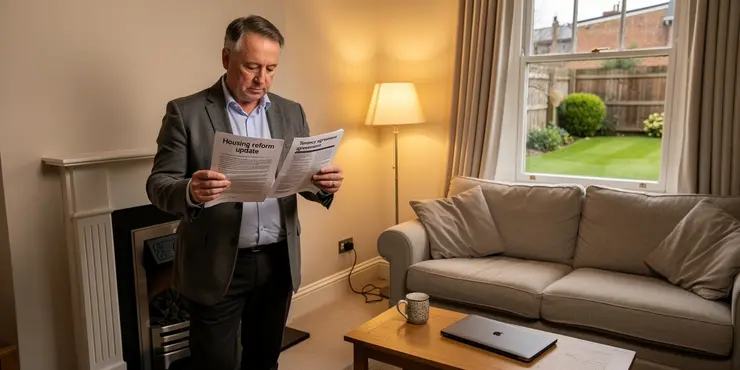
How do these reforms affect landlords?
Relevance: 54%
-
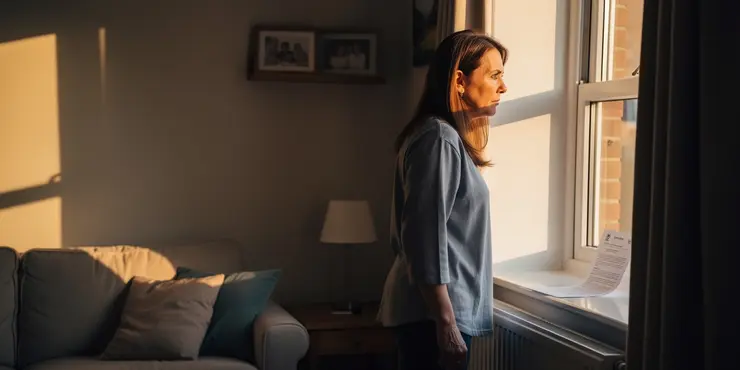
Can I appeal a court's eviction decision?
Relevance: 51%
-

Is mediation an option to resolve eviction disputes?
Relevance: 51%
-

What should I do if I can't afford a lawyer for the eviction process?
Relevance: 48%
-

Are there any government programs that can help me avoid eviction?
Relevance: 47%
-

How are disputes between landlords and tenants handled?
Relevance: 47%
-
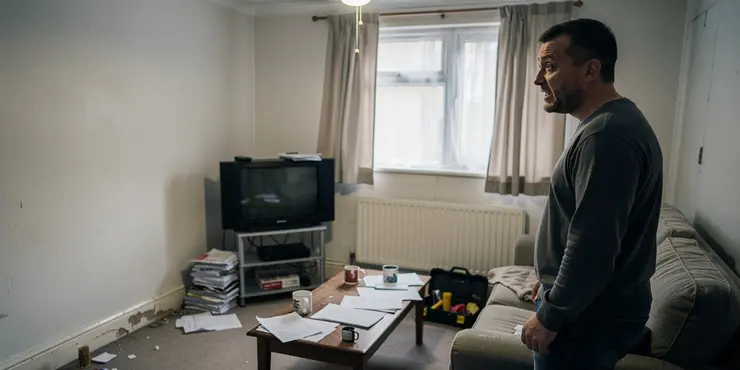
Landlord Licensing Laws Under Review as Tenants Call for Stronger Protections
Relevance: 44%
-

How do I find alternative housing quickly if evicted?
Relevance: 41%
-

How are landlord-tenant issues resolved in property litigation?
Relevance: 40%
-

How will the cuts impact landlords?
Relevance: 40%
-

What are the new Tenancy Law Reforms in the UK in 2025?
Relevance: 37%
-

Are landlords required to provide energy performance certificates?
Relevance: 36%
-

What new protections are included for tenants?
Relevance: 35%
-

What can tenants do if they are affected by the cuts?
Relevance: 32%
-

5 Broker Exclusive Buy to Let Mortgage Lenders you need to know about as a Landlord
Relevance: 32%
-

Watchdog Raises Concerns Over Commercial Landlord Regulations
Relevance: 31%
-

How does the reform impact renting costs?
Relevance: 29%
-
Can my medical records be withheld for any reasons?
Relevance: 25%
-

What changes affect pet policies in rented homes?
Relevance: 25%
-

Are there reforms concerning subletting?
Relevance: 25%
-

Use of reasonable adjustments to reduce health inequalities for people with a learning disability
Relevance: 25%
-

What are common reasons for product recalls?
Relevance: 24%
Introduction
The question of whether a landlord can evict a tenant without providing a reason is an important one for many renters in the UK. Understanding the legal framework surrounding evictions can help tenants know their rights and what to expect in different situations. This article explores the circumstances under which a landlord may evict a tenant without providing a specific reason, focusing on Assured Shorthold Tenancies (ASTs), the most common type of tenancy in England and Wales.
Assured Shorthold Tenancies (ASTs) and Section 21
In the UK, Assured Shorthold Tenancies are a prevalent type of rental agreement. Under an AST, landlords have the option to use what is commonly referred to as a 'no-fault' eviction process by serving a Section 21 notice. A Section 21 notice allows landlords to regain possession of their property at the end of the fixed term or during a periodic tenancy, provided they follow the correct legal procedure. Importantly, this process does not require the landlord to provide a reason for the eviction.
Legal Requirements for a Valid Section 21 Notice
For a Section 21 notice to be valid, it must adhere to specific legal requirements. Firstly, the notice must be served in writing, and landlords must provide at least two months' notice to the tenant. Additionally, the notice cannot be served during the first four months of the original tenancy term. Landlords must also ensure compliance with certain legal obligations, such as providing tenants with an up-to-date Gas Safety Certificate, an Energy Performance Certificate (EPC), and the Government's 'How to Rent' guide at the beginning of the tenancy.
Restrictions on Section 21 Evictions
There are restrictions to prevent misuse of the Section 21 process. For instance, landlords cannot serve a Section 21 notice if they have not registered the tenant's deposit with a government-approved scheme or if the local authority has issued an improvement notice regarding the property within the past six months. These measures are in place to protect tenants from unfair eviction and ensure landlords maintain their properties to a decent standard.
Proposed Reforms and Future Considerations
The UK government has proposed reforms to end 'no-fault' evictions in England, which would significantly impact landlords' ability to use Section 21 notices. If enacted, these changes would mean that landlords need to provide a valid reason for wanting to end a tenancy. The Renters' Reform Bill, introduced in 2022, aims to address these issues, though it has yet to be passed into law.
Conclusion
While landlords currently have the capability to evict tenants without providing a reason through a Section 21 notice, they must comply with several legal requirements. Tenants should stay informed about their rights and how potential legislative changes might impact their situation. For the most accurate and personalized advice, tenants should consider consulting legal professionals or tenant support organizations.
Introduction
Can a landlord make a renter leave without giving a reason? This is an important question for many people who rent homes in the UK. Knowing the rules about evictions can help renters understand what rights they have and what might happen. This article talks about when a landlord can ask a tenant to leave without saying why. We will look at Assured Shorthold Tenancies (ASTs), which is the most common type of rental in England and Wales.
Assured Shorthold Tenancies (ASTs) and Section 21
In the UK, many people rent homes through a type of agreement called an Assured Shorthold Tenancy (AST). With ASTs, landlords can use a special rule called a 'no-fault' eviction to ask tenants to leave. This is done by giving a Section 21 notice. A Section 21 notice means the landlord wants the home back, either at the end of the rental period or during an ongoing rental. The landlord does not need to give a reason as long as they follow the rules.
Legal Requirements for a Valid Section 21 Notice
There are rules for making a Section 21 notice valid. It has to be in writing, and the landlord must give the tenant at least two months to move out. The landlord cannot give the notice in the first four months of renting. They also need to have done other things, like giving the renter a Gas Safety Certificate, an Energy Performance Certificate (EPC), and the Government's 'How to Rent' guide when the renter first moved in.
Restrictions on Section 21 Evictions
There are rules to stop Section 21 from being used unfairly. For example, a landlord cannot use Section 21 if they did not put the tenant's deposit in a government-approved scheme. Also, if the local council told the landlord to fix something important in the house in the past six months, they cannot use Section 21. These rules help protect renters from being asked to leave unfairly and make sure landlords keep homes safe and nice.
Proposed Reforms and Future Considerations
The UK government wants to change the rules about 'no-fault' evictions in England. This could change how landlords can use Section 21. If the new rules happen, landlords will need a good reason to ask a tenant to leave. The Renters' Reform Bill, started in 2022, is meant to change these rules. But it is not a law yet.
Conclusion
Right now, landlords can use a Section 21 notice to ask tenants to leave without a reason, but they have to follow certain rules. Renters should know their rights and keep up-to-date with any changes in the law. For the best advice, renters can talk to legal experts or tenant support groups.
Frequently Asked Questions
Can my landlord evict me without providing a reason?
It depends on the type of lease agreement you have and the local laws. In many places, landlords cannot evict tenants without a valid reason during the lease term, but they may not need to provide a reason at the end of a lease if they choose not to renew.
Are there any laws that prevent no-cause evictions?
Yes, many jurisdictions have laws that protect tenants from being evicted without cause, especially during a lease term. These laws vary by location.
What is a no-cause eviction?
A no-cause eviction occurs when a landlord asks a tenant to leave without providing a reason. This is generally only allowed under certain circumstances, such as the end of a lease term, depending on the local laws.
Can my landlord evict me during my lease term without a reason?
Typically, a landlord cannot evict a tenant during the lease term without cause, unless the lease includes specific terms that allow for such actions under certain conditions.
Can a landlord refuse to renew a lease without providing a reason?
In many areas, a landlord can choose not to renew a lease without providing a reason, as long as they follow proper notice procedures.
Does the type of lease affect whether a landlord can evict without cause?
Yes, the terms of your lease can affect eviction rights. For example, month-to-month leases often allow landlords more flexibility in ending the tenancy without cause than fixed-term leases.
What is an at-will tenancy?
An at-will tenancy means that either the landlord or the tenant can choose to end the tenancy without cause, generally with a proper notice period.
Are month-to-month leases subject to no-cause evictions?
Yes, month-to-month leases often allow landlords to terminate the lease without cause, provided they give proper notice as required by law.
What is a formal eviction process?
The formal eviction process is a legal procedure a landlord must follow to remove a tenant from the property legally, often involving court proceedings.
Can a landlord give me a notice to vacate without a reason?
It depends on your lease and local laws. In some cases, landlords can give a notice to vacate without stating a reason, especially with month-to-month leases.
Can local laws affect no-cause evictions?
Yes, local laws significantly impact a landlord's ability to conduct no-cause evictions. It's important to be familiar with these laws in your area.
Do I have rights during the eviction process?
Yes, tenants typically have rights throughout the eviction process, including proper notice and legal procedures that must be followed.
What notice is required for a no-cause eviction?
The notice period can vary depending on local laws and lease terms. It often ranges from 30 to 60 days for month-to-month leases.
What should I do if I receive a no-cause eviction notice?
If you receive a no-cause eviction notice, review your lease and local laws, and consider seeking legal advice to understand your rights.
Are there any exceptions to no-cause eviction rules?
Exceptions to no-cause eviction rules often include discrimination or retaliation, which are generally illegal grounds for eviction.
Can a landlord evict for discriminatory reasons without giving a reason?
No, evicting for discriminatory reasons is illegal, even if no reason is stated. Anti-discrimination laws protect tenants from such actions.
Is it necessary for a landlord to go to court for an eviction without cause?
Yes, formal eviction procedures usually require court involvement, even in no-cause eviction situations, to ensure the eviction is lawful.
What can I do if I believe my eviction is unjust?
If you believe your eviction is unjust, you may seek legal advice, challenge the eviction in court, or contact local tenant rights organizations.
How does the eviction notice period differ between lease types?
For a fixed-term lease, the eviction notice period may only apply at the end of the lease, while month-to-month leases generally require a 30- to 60-day notice.
Can a landlord terminate a tenancy for retalition even without giving a reason?
No, retaliatory evictions are illegal. Even if a reason isn't given, if the eviction can be shown to be in retaliation for tenant actions, it can be contested.
Can my landlord make me leave without saying why?
It depends on the kind of lease (rental) agreement you have and the rules where you live. In many places, landlords cannot make people leave without a good reason while the lease is still going. But they might not need a reason if they decide not to renew (continue) the lease when it ends.
Are there rules that stop people from being kicked out for no reason?
Yes, lots of places have rules to stop people from getting kicked out of their homes for no reason, especially if they have a rental agreement. These rules can be different depending on where you live.
What does no-cause eviction mean?
No-cause eviction is when a landlord asks a tenant to leave without giving a reason.
Here are some ways to understand it better:
- Ask someone you trust to explain it to you.
- Use pictures to help understand what eviction means.
A no-cause eviction is when a landlord tells a tenant to move out but doesn't say why. This can usually happen for specific reasons, like when the lease is over, and it depends on the rules in the area.
If you find this hard to understand, you might try reading tools like text-to-speech, which reads the text out loud, or using reading apps that highlight words as they are read.
Can my landlord make me leave before my lease ends without a reason?
Usually, a landlord cannot make a tenant leave before the lease is finished unless there is a good reason. Sometimes, the lease might have special rules that say when the landlord can do this.
Can a landlord say no to renewing a lease without giving a reason?
This means: Can the person who owns the building say you can't stay longer even if they don't tell you why?
To help understand, you can:
- Ask someone to explain it.
- Use pictures to understand better.
- Read slowly and think about each word.
In many places, a landlord can decide not to renew a lease. They don't have to say why, but they must give proper notice.
Can a landlord make you leave for no reason depending on the lease type?
Yes, the rules in your lease can change eviction rights. For example, if you rent month-to-month, your landlord can end the lease more easily without a reason compared to if you have a lease that lasts a set time, like a year.
What is an at-will tenancy?
At-will tenancy means you can stay in your home for as long as you and the landlord agree. You don't have a set end date.
You or the landlord can decide to end it anytime. Usually, you need to tell the other person a few days before.
If you need help understanding or remembering information, you can:
- Use pictures or drawings to explain things.
- Ask someone you trust to explain it.
- Make a checklist of what to do if you want to leave.
An at-will tenancy means that the landlord or the tenant can stop renting at any time. They just need to give a proper notice first.
Can you be asked to move out for no reason if you rent month-to-month?
Yes, with a month-to-month lease, landlords can end the lease without needing a reason. They just have to tell you in advance, following the law.
What is a formal eviction process?
A formal eviction process is when a landlord makes a tenant leave their home in a legal way. It follows certain rules.
Here is a simple way to understand it:
- The landlord must give the tenant a paper notice. This is called an eviction notice.
- The notice will say why the tenant has to leave. It might be because they did not pay rent or broke rules.
- If the tenant does not leave, the landlord can go to court. The court will decide what happens next.
It can be helpful to ask for help if you go through this. You can:
- Talk to a lawyer or get free legal advice.
- Use a calendar to keep track of dates and deadlines.
- Ask a friend or family member to help read and understand letters.
The formal eviction process is a set of steps a landlord must take to legally make a tenant leave their home. This usually means they have to go to court.
Can my landlord ask me to move out without saying why?
It depends on your rental agreement and the laws where you live. Sometimes, landlords can ask you to move out without saying why. This often happens with monthly rental contracts.
Can local rules stop evictions without a reason?
Yes, local rules are very important for landlords who want to evict someone without a reason. It is important to know these rules where you live.
You might find diagrams or simple charts helpful.
Do I have rights if I am being asked to leave my home?
Yes, people who rent homes have rights if someone tries to make them leave. They need to get a fair warning, and it has to be done the right way by law.
How much time do you get before you have to move out for no reason?
The time you have to tell someone you are leaving can be different. It depends on the rules where you live and the agreement you signed. Usually, you need to let them know 30 to 60 days before if you rent by the month.
What can I do if I get a letter saying I have to move out?
If you get a paper saying you have to leave your home for no reason, here's what you can do:
1. **Look at Your Agreement**: Check the paper you signed when you moved in.
2. **Check Local Rules**: See what the rules are where you live. They might help you.
3. **Ask for Help**: Talk to a lawyer. They can tell you what you can do.
You can also use tools like dictionaries to help understand big words or get a friend to read it with you.
Are there times when a landlord can make you leave without a reason?
Usually, landlords need a reason to make you leave your home. But sometimes they don’t. Here are a few times they can ask you to leave:
- If you don't pay rent or break the rules
- If they or their family want to live in the house
- If they want to sell the house
If you get a notice to move, try these steps:
- Ask someone you trust for help
- Call a local housing support service
These people can give you advice and help you understand your options.
Sometimes a landlord cannot make you leave your home for no reason. It's against the law to make you leave because of things like unfair treatment or getting back at you for something. This is not allowed.
Can a landlord make you leave your home because they are being unfair?
No, you cannot make someone leave their home because of unfair reasons. This is against the law. There are rules to protect people who rent homes from being treated unfairly.
Does a landlord have to go to court to evict someone without a reason?
Yes, if someone is being asked to leave their home, there is usually a court process involved. This helps make sure everything is done the right way and is fair.
What can I do if I think being asked to leave my home is not fair?
If you think it's not fair that you have to leave your home, here is what you can do:
- Talk to a lawyer. They can help you understand your rights.
- Go to court to stop the eviction.
- Call a local group that helps renters. They can give you advice.
Tools that can help:
- Friends or family members who can give you support.
- Reading services that make it easier to read documents.
- Apps that help you understand legal words.
Different Types of Leases: How Long Before You Have to Leave?
When you rent a place, the rules about leaving can be different. This depends on the type of agreement, or "lease," you have.
If you have to leave, you usually get a note called an "eviction notice." This note tells you when you must move out.
The time you get before moving out can change. It depends on your lease.
Here are some things that might help:
- Ask someone you trust to explain the lease.
- Use picture guides to understand your lease better.
- Try using apps that read text out loud.
If you have a lease for a set amount of time, like one year, you can usually only get an eviction notice when the lease ends. But if your lease goes month-to-month, the landlord usually needs to give you a 30 to 60 days’ notice before you have to leave.
Can a landlord end a rental agreement to get back at you without saying why?
No, it's not okay for landlords to evict you just because they're upset with you. This is against the law. Even if they don't say why, if you can show that they're doing it to get back at you for something, you can fight it.
Useful Links
This website offers general information and is not a substitute for professional advice.
Always seek guidance from qualified professionals.
If you have any medical concerns or need urgent help, contact a healthcare professional or emergency services immediately.
Some of this content was generated with AI assistance. We’ve done our best to keep it accurate, helpful, and human-friendly.
- Ergsy carfully checks the information in the videos we provide here.
- Videos shown by Youtube after a video has completed, have NOT been reviewed by ERGSY.
- To view, click the arrow in centre of video.
- Most of the videos you find here will have subtitles and/or closed captions available.
- You may need to turn these on, and choose your preferred language.
- Go to the video you'd like to watch.
- If closed captions (CC) are available, settings will be visible on the bottom right of the video player.
- To turn on Captions, click settings .
- To turn off Captions, click settings again.
More Items From Ergsy search
-

Can my landlord evict me without providing a reason?
Relevance: 100%
-

What can I do if my landlord wants to evict me?
Relevance: 84%
-

Can I negotiate with my landlord to avoid eviction?
Relevance: 78%
-

Can a landlord evict me for complaining about property conditions?
Relevance: 74%
-

What should I do if I receive an eviction notice from my landlord?
Relevance: 73%
-

Can a landlord lock me out or remove my belongings to evict me?
Relevance: 72%
-

Are there changes to the eviction process?
Relevance: 63%
-

What are my rights during the eviction process?
Relevance: 61%
-

What can I do if I believe my eviction is retaliatory?
Relevance: 59%
-

Can I stop an eviction if I catch up on rent payments?
Relevance: 58%
-

How can I prepare for an eviction court hearing?
Relevance: 57%
-

Does filing for bankruptcy stop an eviction?
Relevance: 57%
-

Has the notice period for eviction changed?
Relevance: 57%
-

How can I contest or challenge the eviction?
Relevance: 57%
-

What are the consequences of having an eviction on my record?
Relevance: 56%
-

What happens if I stay beyond the eviction deadline?
Relevance: 56%
-

Can eviction affect my credit score?
Relevance: 55%
-

How long do I have to move out after receiving an eviction notice?
Relevance: 55%
-

How do these reforms affect landlords?
Relevance: 54%
-

Can I appeal a court's eviction decision?
Relevance: 51%
-

Is mediation an option to resolve eviction disputes?
Relevance: 51%
-

What should I do if I can't afford a lawyer for the eviction process?
Relevance: 48%
-

Are there any government programs that can help me avoid eviction?
Relevance: 47%
-

How are disputes between landlords and tenants handled?
Relevance: 47%
-

Landlord Licensing Laws Under Review as Tenants Call for Stronger Protections
Relevance: 44%
-

How do I find alternative housing quickly if evicted?
Relevance: 41%
-

How are landlord-tenant issues resolved in property litigation?
Relevance: 40%
-

How will the cuts impact landlords?
Relevance: 40%
-

What are the new Tenancy Law Reforms in the UK in 2025?
Relevance: 37%
-

Are landlords required to provide energy performance certificates?
Relevance: 36%
-

What new protections are included for tenants?
Relevance: 35%
-

What can tenants do if they are affected by the cuts?
Relevance: 32%
-

5 Broker Exclusive Buy to Let Mortgage Lenders you need to know about as a Landlord
Relevance: 32%
-

Watchdog Raises Concerns Over Commercial Landlord Regulations
Relevance: 31%
-

How does the reform impact renting costs?
Relevance: 29%
-
Can my medical records be withheld for any reasons?
Relevance: 25%
-

What changes affect pet policies in rented homes?
Relevance: 25%
-

Are there reforms concerning subletting?
Relevance: 25%
-

Use of reasonable adjustments to reduce health inequalities for people with a learning disability
Relevance: 25%
-

What are common reasons for product recalls?
Relevance: 24%


